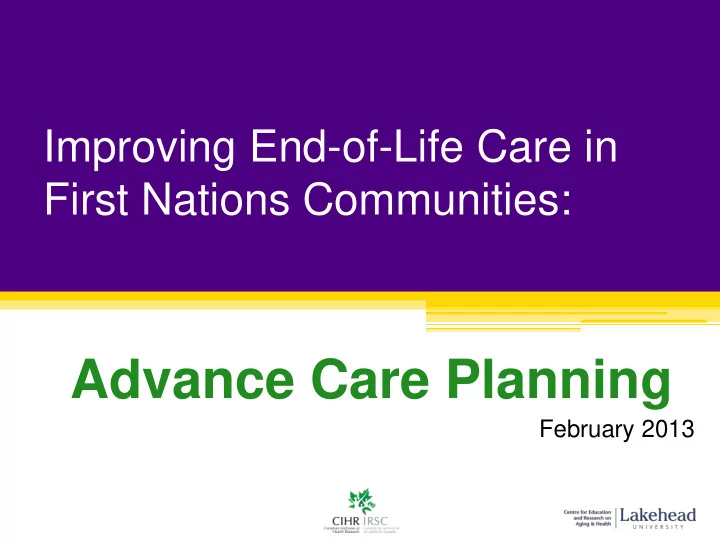

Improving End-of-Life Care in First Nations Communities: Advance Care Planning February 2013
Kimberly Ramsbottom HBSW, MSW Research Assistant CERAH, EOLFN Lakehead University
Research Goal • To improve end-of-life care in four First Nations communities through developing local palliative care programs and teams • To create a tool kit for developing palliative care programs in First Nations communities that can be shared nationally
Palliative Care Palliative care is whole-person health care that aims to relieve suffering and improve the quality of living and dying. CHPCA, 2008
Holistic Care
Canadian Hospice Palliative Care Association-Introduction • http://www.youtube.com/watch?v=2aOX9abJhio #t=24
Statistics • 86% of Canadians have not heard of the term “advance care planning” • Only 9% had ever spoken to a health care provider about their wishes for care or treatments • Over 80% of Canadians do not have a written plan • Only 46% have designated a substitute decision maker Canadian Hospice Palliative Care Association, 2013
What is Advance Care Planning (ACP)? • A process of contemplation, reflection and communication where an individual conveys their wishes for treatment and their care needs • The consideration of appointing a Substitute Decision Maker (SDM) • Have these conversations with your SDM while you are CAPABLE Ontario Seniors Secretariat, 2013
Advance Care Planning • Wishes may be expressed in any form (verbal, writing, audio, bliss board, braille, video tape) • Written advance care planning documents include a Power of Attorney for Personal Care and/or Advance Directives • A valuable way to ensure that your wishes for end- of-life treatment are followed Ontario Seniors Secretariat, 2013
“No it’s just an unexpected part of life that, I can be healthy and sit here today but I could be going home and get in an accident and then that accident can cause me to be brain dead. Do I want to be on life support brain dead? Well my doctor needs to know that. I don’t want no heroic thing done to me. So that’s what a living will is. It’s letting the doctor know that you don’t want heroics .” Fort William Community Member
Why is ACP important? • In Canada chronic disease accounts for 70% of all deaths and 70 % of people who die are 65 or older • Research has shown that First Nation people have a higher prevalence to suffer from 2 or more chronic diseases • If an individual wishes are known for treatment/care it can relieve or lessen the families, loved ones and health care practitioners stress, anxiety and guilt encompassing an individuals end-of-life care • ACP assures that a health care practitioner always has someone to talk with about treatment decisions Canadian Hospice Palliative Care Association, 2013
Substitute Decision Makers (SDM) • Is the person (s) who makes treatment decisions for an individual if they become incapable to make those decisions for themselves • SDM’s are to act in the best interest of the individual • Must be capable, at least 16 years of age • Not prohibited by court order • Must be willing and available Health Care Consent Act, 1996
SDM Hierarchy • Guardian of individual • Attorney named in POAPC • Representative appointed by the Consent and Capacity Board • Partner or Spouse • Child or Parent • Parent with right of access • Brother or Sister • Any other relative • Public Guardian or Trustee Health Care Consent Act, 1996
SDM: • Act in the best interest of the individual • Make decisions for present medical treatments based on the individuals prior expressed wishes • If wishes are not known than decisions are based in the individuals best interest • SDM cannot ACP for an individual
SDM should consider: • The individuals values and beliefs • The individuals current wishes • If the decisions will: improve the individuals quality of life, prevent the individuals quality of life from deteriorating, or reduce the extent or the rate that the individuals quality of life will deteriorate • Or whether the risk out weighs the benefit to the individual Substitute Decision Act, 1996
Benefits of ACP • Your holistic beliefs are respected • Your wishes and choices for care are valued • Having someone to speak for you in the event you are unable • Lessons family members, loved ones, and caregivers stress, anxiety, and guilt about treatment and care • Die with dignity
Additional Comments • Consider your Substitute Decision Maker • Completing an Advance Care Plan • Continued Communication
References • Canadian Hospice Palliative Care Association, 2013 • Advancecareplanning.ca, 2013 • Ontario Seniors’ Secretariat, 2012
Contact Information Dr. Mary Lou Kelley Principle Investigator Phone (807) 766-7270 Email mlkelley@lakeheadu.ca Kimberly Ramsbottom Research Assistant Phone (807) 766-7297 Email kramsbot@lakeheadu.ca www.eolfn.lakeheadu.ca
Recommend
More recommend